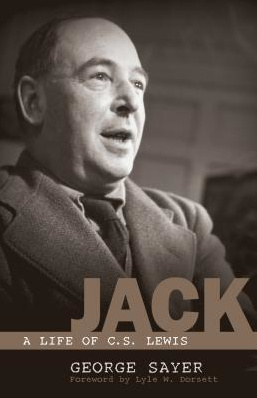

“And once when we were walking on Bredon Hill, we met a bedraggled and exhausted fox. 'Oh, poor thing,' Jack said. 'What shall we do when the hunt comes up? I can already hear them. Oh, I know -- I have an idea.' He cupped his hands and shouted to the first riders, "Hallo, yoicks, gone that way," and pointed in the direction opposite to the one the fox had taken. The whole hunt followed his directions. There followed a long discussion about when lying was morally justifiable, but he boasted delightedly later to my wife that he had saved the life of a poor fox and showed no trace of guilt.”
― quote from Jack: A Life of C. S. Lewis
“He valued these experiences of joy more than anything else he had known, and he desired, as all who have experienced them desire, to have them again and again. It was this mystical quality that set him apart from other boys. He was surprised by joy. He spent the rest of his life searching for more of it.”
― quote from Jack: A Life of C. S. Lewis
“She wants to live simply and thinks luxuries little more than social display.”
― quote from Jack: A Life of C. S. Lewis
“a radiant and infectious, almost childlike gaiety which was always bubbling over into delighted and delightful laughter.”
― quote from Jack: A Life of C. S. Lewis
“During one walk, Jack engaged in the first metaphysical argument that he can remember. It concerned the nature of the future: Is it like a line that you can’t see or a line that is not yet drawn? He would delight in such arguments for the rest of his life.”
― quote from Jack: A Life of C. S. Lewis

“To the end of his life he enjoyed traveling by train, the slower the better, and, if possible, in the front carriage.”
― quote from Jack: A Life of C. S. Lewis
“I’d done so many things I wasn’t supposed to do that by then I was ready to try any idea that came to me.”
― Jean M. Auel, quote from The Shelters of Stone
“It was different with you, Leo. In the eyes and ears of my heart, you and the magic are one and the same.”
― Jerry Spinelli, quote from Love, Stargirl
“She tortured everybody around her, but only because she was more tortured than anyone.”
― Lev Grossman, quote from The Magicians
“The real me isn't the person I describe, no the real me is the me revealed by my actions.”
― Malcolm Gladwell, quote from Blink: The Power of Thinking Without Thinking
“Which of us is not forever a stranger and alone?”
― Thomas Wolfe, quote from Look Homeward, Angel
BookQuoters is a community of passionate readers who enjoy sharing the most meaningful, memorable and interesting quotes from great books. As the world communicates more and more via texts, memes and sound bytes, short but profound quotes from books have become more relevant and important. For some of us a quote becomes a mantra, a goal or a philosophy by which we live. For all of us, quotes are a great way to remember a book and to carry with us the author’s best ideas.
We thoughtfully gather quotes from our favorite books, both classic and current, and choose the ones that are most thought-provoking. Each quote represents a book that is interesting, well written and has potential to enhance the reader’s life. We also accept submissions from our visitors and will select the quotes we feel are most appealing to the BookQuoters community.
Founded in 2023, BookQuoters has quickly become a large and vibrant community of people who share an affinity for books. Books are seen by some as a throwback to a previous world; conversely, gleaning the main ideas of a book via a quote or a quick summary is typical of the Information Age but is a habit disdained by some diehard readers. We feel that we have the best of both worlds at BookQuoters; we read books cover-to-cover but offer you some of the highlights. We hope you’ll join us.